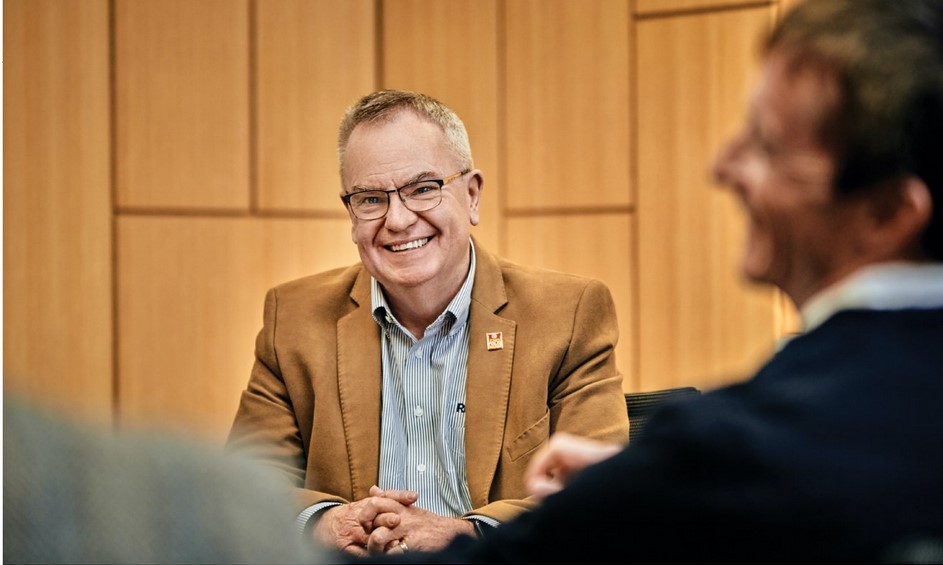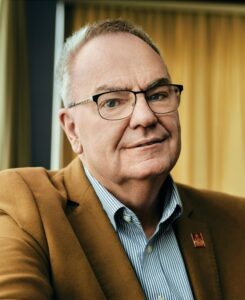
Rotary International’s president-elect Gordon McInally is here responding to questions about the next Rotary year.
Rotary Norden nr 2, 2023
”Caring” as the core value
If you ask Gordon McInally anything about his upcoming year as Rotary International president, he’ll immediately stop you. “It’s not about my year. It’s about one of Rotary’s years,” he corrects. “I’m a great believer in continuity, and I don’t see the years in isolation.”
On a blustery October day, McInally (that’s pronounced MAK’-ihn-al-ee) sat down with six members of Rotary’s communications team to take questions gathered via social media from Rotary members around the world. He has a quick sense of humor and an easy banter that filled the room with laughter as a film crew set up boom mikes, cameras, and lights. In introducing himself as a member of the Rotary Club of South Queensferry, Scotland, he quipped about his distinctive speech: “Despite the lack of an accent, I am Scottish, and very proud of that fact.”
He would like to use his year — scratch that, the 2023-24 Rotary year — to spotlight mental health, an issue that has touched his family directly and that is all too often kept under wraps. McInally is an ambassador for Bipolar UK, an organization that supports people with the illness as well as their families and caregivers. Rotary International in Great Britain and Ireland recently launched a partnership with the organization to bring members’ skills to help build a more robust network of support groups around the country. “I’m a big believer in using Rotary members’ skills, rather than just their check books,” he says.
The following is a condensed version of the town hall meeting with McInally in October.
What are your core values, and how do they shape how you lead?
My core value can be expressed in one word, and that is “caring.” I like to think that I care for people. Professionally as a dentist, I cared for people for many, many years. It’s something that was instilled in me by my parents. It’s something that we have instilled in our own children. And the great thing is I now see it being instilled in our grandchildren. I think if the world was a more caring place, a kinder place, then it would be a much happier place and a much more peaceful place. Peace is one of the issues that I particularly want to see us move forward.
How can we reignite members of Rotary who appear to have “lost their spark”?
I think the way to reignite the lost spark in certain members of Rotary is to make sure that the Rotary club experience is as good as it can be, and suits everybody. It’s not a case of one-size-fits-all.
Some clubs will want to meet in a country club and spend 2.5 hours over lunch. Other clubs will want to meet for 45 minutes on a Saturday morning over coffee and a bagel, and then get out and do service.
It all comes down to the service. We are a membership organization and a service organization. It’s not an either/or. We need to be out there doing service, because not only will we enjoy that more, we will also see more people want to come and join us because they can see us.
What concrete plans does Rotary have to address climate change in 2023-24?
One of the big projects that we’re working on at the moment is planting mangroves in various places around the world, and there are many others. But we have to remember that Rotary, on its own, will not be able to solve the problem of climate change. We need to work at the level we are capable of working at and encourage and advocate governments around the world to ensure that we address the issue of climate change going forward.
How can we motivate more Rotaractors to join Rotary clubs?
We need to bring them into Rotary clubs as Rotaractors and allow them to help shape the club going forward.
We talk about mentoring. But there’s reverse mentoring, as well. We can learn so much from Rotaractors. One of the most successful places in the world at integrating Rotaractors into Rotary is in Hong Kong. They move seamlessly from Rotaract into Rotary. As a result, there’s hardly a division. They have a wonderful way of integrating Rotaract and Rotary together. People say that Rotaract is the future of Rotary, but it’s actually the present.
What youth programs are important to you?
I’m a great fan of RYLA [Rotary Youth Leadership Awards]. We have seen very successful RYLAs in our part of the world. If you take a high school student with potential to a RYLA experience, the change that can take place is amazing. Sometimes the quiet, introverted young students who go to a RYLA experience have, by the end of it, found themselves and are blossoming. It’s important we send people with potential to the RYLA experience — not the highflyers, because they’re going to fly high anyway. It’s the people we have the potential to develop.
I’m also a great believer in Rotary Youth Exchange. I’m delighted that we are now in a position to reignite the youth exchange program. Just over the past few weeks, I’ve seen young people flying all around the world for what will be a life-changing experience. That comes back to the whole issue of creating a more peaceful world. Because if we can take young people and let them meet other young people and live in other cultures for a year, then we realize that basically we’re all the same people. There is no need for conflict because we’re all trying to pull in the same direction, and we all desire the same thing.
What is the biggest potential you see in Rotary as an organization that has not been fully realized?
We saw a great increase in volunteerism during the pandemic. I think we have a great opportunity to connect with those people and encourage them to carry on volunteering through Rotary. I believe it’s in everybody’s nature to care for other people. If we can bring that out of people, and if we can build on the spirit of care that we saw during the pandemic, what a wonderful legacy. About 6.5 million people died as a result of COVID around the world, and so they must not die in vain. If we can connect with the people who reignited their spirit of volunteering during that period, then we will have achieved something.
Watch the full conversation at rotary.org
